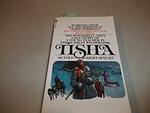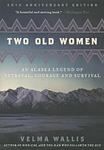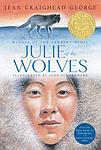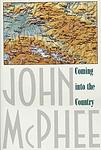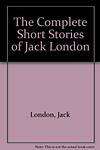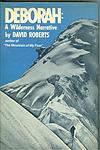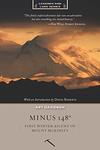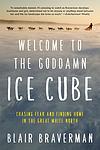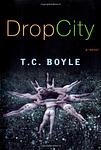The Greatest "Alaska" Books of All Time
Click to learn how this list is calculated.
This list represents a comprehensive and trusted collection of the greatest books. Developed through a specialized algorithm, it brings together 284 'best of' book lists to form a definitive guide to the world's most acclaimed books. For those interested in how these books are chosen, additional details can be found on the rankings page.
Genres
Countries
Date Range
Reading Statistics
Click the button below to see how many of these books you've read!
Download
If you're interested in downloading this list as a CSV file for use in a spreadsheet application, you can easily do so by clicking the button below. Please note that to ensure a manageable file size and faster download, the CSV will include details for only the first 500 books.
Download-
1. The Call of the Wild by Jack London
This book tells the story of a domesticated dog named Buck who is stolen from his home in California and sold into service as a sled dog in Alaska. As he faces harsh conditions and brutal treatment, Buck must learn to adapt to the wild and harsh environment, ultimately reverting to his ancestral instincts in order to survive. The book explores themes of nature versus nurture, civilization versus wilderness, and the struggle for dominance.
-
2. Into the Wild by Jon Krakauer
This striking narrative non-fiction tells the real-life story of a young man who turns his back on society to live in the Alaskan wilderness. Despite a privileged background and a promising future, he donates his savings to charity, abandons his car and most of his possessions, and embarks on a journey into the wild. His solitary existence in the wild, his struggles for survival, and his untimely death provide a profound exploration of the allure of wilderness and the human yearning for solitude and self-discovery.
-
3. Two In The Far North by Margaret E. Murie
This book is a captivating memoir that chronicles the life and adventures of a pioneering conservationist in the Alaskan wilderness. It weaves together personal narratives of love, loss, and discovery with the breathtaking backdrop of the Arctic landscape. The author shares her experiences from her youth, her marriage to a fellow naturalist, and their shared expeditions into the remote regions of Alaska. Their work in wildlife biology and tireless efforts in environmental conservation played a crucial role in the establishment of the Arctic National Wildlife Refuge. The memoir is not only a tribute to the untamed beauty of the North but also a testament to the enduring spirit of those who dedicate their lives to preserving it.
-
4. Williwaw by Gore Vidal
This novel is a gripping maritime adventure set in the treacherous waters of the Alaskan coastline during World War II. It follows the story of two young brothers who are left in charge of a Navy patrol boat while their commander is away. As they navigate the challenges of leadership and survival against the backdrop of the williwaw—a sudden and violent storm common in the region—their resilience, ingenuity, and bonds are tested. The narrative combines elements of suspense, natural danger, and the complexities of growing up under extraordinary circumstances, marking an impressive debut from its author.
-
5. The Roots Of Ticasuk by Ticasuk Brown
"The Roots of Ticasuk" is an autobiographical work that delves into the rich cultural heritage and personal history of an Alaskan Native educator. The book provides an intimate look at the author's upbringing, traditions, and the wisdom of her people, offering insights into the indigenous ways of knowing and living in harmony with the land. Through her narrative, the author shares her experiences growing up in a remote community, her educational journey, and her dedication to preserving and teaching her native language and culture, highlighting the importance of identity and the resilience of her community in the face of change and modernization.
-
6. Tisha by Robert Specht
"Tisha" is a biographical novel based on the true story of a young woman who moves to the Alaskan wilderness in the 1920s to become a teacher. The protagonist faces numerous challenges including harsh weather, isolation, and cultural differences, but remains steadfast in her commitment to educate the children in her care. The story also explores her fight against racial prejudice in the community, as well as her love affair with a half-Native man.
-
7. Road Song by Natalie Kusz
"Road Song" is a poignant memoir that recounts the author's harrowing childhood after her family moves to Alaska in pursuit of a simpler life. The narrative delves into the struggles they face, including a tragic accident that leaves the author disfigured and the family's ongoing battle with poverty, isolation, and the harsh Alaskan wilderness. Through vivid storytelling, the memoir explores themes of resilience, family bonds, and the pursuit of the American dream, all while painting a stark portrait of the challenges and beauty found in the untamed northern frontier.
-
8. Two Old Women by Velma Wallis
This book is a poignant tale of survival and resilience that follows the journey of two elderly women abandoned by their tribe during a brutal winter famine. Faced with the harsh realities of the Arctic wilderness, the women must overcome the physical challenges of their age, societal expectations, and their own fears. Relying on each other and the skills passed down from their ancestors, they defy the odds by finding new strength and proving that those deemed weak and useless can offer wisdom and fortitude. Their story is a testament to the power of friendship and the indomitable human spirit.
-
9. Julie Of The Wolves by Jean Craighead George
This novel follows the journey of a young Inuit girl named Julie, who finds herself lost in the Alaskan wilderness after running away from home. In her quest for survival, she becomes integrated into a pack of wolves, learning their ways and earning their trust. Through this unique experience, Julie, also known by her Eskimo name Miyax, embarks on a profound journey of self-discovery, survival, and a deep understanding of the natural world around her. The story beautifully explores themes of identity, cultural conflict, and the intricate bonds between humans and nature.
-
10. Coming into the Country by John McPhee
This book provides an in-depth exploration of Alaska, its wilderness, and the people who inhabit it. The narrative is divided into three parts, detailing the urban, rural, and wilderness areas of the state. It offers a comprehensive look at the unique challenges and lifestyle of Alaskans, the state's history, and its potential future. The author's vivid descriptions and personal interviews provide an intimate and realistic portrayal of life in one of the most remote areas of the United States.
-
11. Slow Homecoming by Peter Handke
The book in question is a lyrical exploration of themes such as identity, memory, and the sense of belonging through a series of interconnected narratives. It follows the journey of an unnamed protagonist who, after a period of self-imposed exile, embarks on a quest for self-discovery and reconnection with his homeland. Through his travels, he reflects on his past experiences, the landscapes he traverses, and the people he encounters, all of which contribute to his gradual understanding of home not just as a physical place, but as a complex tapestry of relationships, history, and inner peace. The narrative is characterized by its introspective tone and vivid, poetic descriptions of both the inner and outer worlds the protagonist navigates.
-
12. The Complete Short Stories of Jack London by Jack London
This collection features the complete short stories written by a renowned American author, known for his vivid portrayals of adventurous and survivalist themes. The stories, often set in the harsh landscapes of the Klondike Gold Rush or the South Pacific, examine complex human nature, survival instincts, and socio-economic conditions of the time. The author's unique storytelling style, combined with his keen observational skills and deep understanding of human psychology, makes each story a compelling read.
-
13. Once Upon An Eskimo Time by Edna Wilder
This book is a heartfelt collection of stories and memories that offer a window into the traditional lifestyle of the Inupiat Eskimos of Alaska. The narrative, rich with cultural heritage, is a personal account from the author's own experiences growing up in a remote village. It captures the essence of a community bound by survival, tradition, and the rhythms of the Arctic environment. Through tales of hunting, fishing, and sharing, the book paints a vivid picture of the values and practices that have sustained the Inupiat people for generations, while also touching on the challenges and changes brought by contact with the outside world.
-
14. What Salmon Know by Elwood Reid
The book is a collection of gritty and raw short stories that delve into the lives of men on the fringes of society. Set against the backdrop of the American landscape, from Alaska to the Southwest, the narratives explore themes of masculinity, survival, and the human condition. The characters, often confronting their own limitations and the harsh realities of their environments, are depicted with a stark realism that exposes their inner struggles and the complex dynamics of their relationships. The stories are woven together with a sense of the natural world, where the metaphor of the salmon's upstream battle resonates with the characters' own uphill struggles.
-
15. The Mountain of My Fear by David Roberts
"The Mountain of My Fear" is a gripping account of a mountaineering expedition that turns tragic. The narrative follows a group of four friends who set out to conquer an unclimbed peak in Alaska. Their journey is filled with treacherous challenges and personal growth. However, the adventure takes a dark turn when one of them falls to his death. The story is not just about the physical climb, but also about the psychological and emotional journey, exploring themes of fear, guilt, and the complex dynamics of friendship.
-
16. A Wilderness Narrative by David Roberts
"A Wilderness Narrative" is an engaging account of a man's journey through the American wilderness. The author vividly describes his experiences and observations as he treks through various landscapes, including mountains, forests, and deserts. The book serves as a reflection on the relationship between humans and nature, exploring themes of solitude, survival, and the sublime beauty and harsh realities of the natural world. It's a compelling exploration of the American wilderness and the profound impact it can have on the human spirit.
-
17. Minus 148 by Art Davidson
"Minus 148" is a gripping account of a mountaineering team's harrowing winter ascent of Mount McKinley in Alaska. The team faces a brutal storm that traps them near the summit, forcing them to endure temperatures of -148 degrees Fahrenheit. Despite the dire conditions and tragic loss of life, the survivors demonstrate an incredible will to live, leading to one of the most remarkable rescues in mountaineering history. The book serves as a testament to the human spirit's resilience and the power of teamwork in the face of adversity.
-
18. Alaska Wilderness by Robert Marshall
"Alaska Wilderness" is an exploration and celebration of one of the last unspoiled regions on Earth - the Alaskan wilderness. The author, through his personal experiences and observations, provides an engaging account of the breathtaking landscapes, diverse wildlife, and the unique lifestyle of the people who live in this harsh yet beautiful environment. The book is a call to action to protect and preserve these natural wonders for future generations.
-
19. Welcome To The Goddamn Ice Cube by Blair Braverman
The memoir chronicles the adventures and personal journey of a young woman who finds resilience and a sense of identity in the harsh and unforgiving landscapes of the Arctic. Through her experiences dogsledding in Norway and living in an Alaskan glacier town, she confronts the challenges of extreme cold and isolation while also grappling with her own past traumas. Her narrative weaves together tales of survival, the complexities of small-town dynamics, and the enduring allure of icy wildernesses, ultimately offering a meditation on the power of nature to both heal and test our limits.
-
20. Drop City by T. Coraghessan Boyle
Set in the 1970s, the novel follows a group of young idealists who form a commune in the wilderness of Alaska with the goal of creating a utopia. The story explores the dynamics within the group, the challenges they face living off the land, and the clash between their ideals and the harsh realities of life in the wilderness. The book also delves into the tension between the commune and the local Alaskan community.
Reading Statistics
Click the button below to see how many of these books you've read!
Download
If you're interested in downloading this list as a CSV file for use in a spreadsheet application, you can easily do so by clicking the button below. Please note that to ensure a manageable file size and faster download, the CSV will include details for only the first 500 books.
Download




